★★★
“Forest of the Dead”
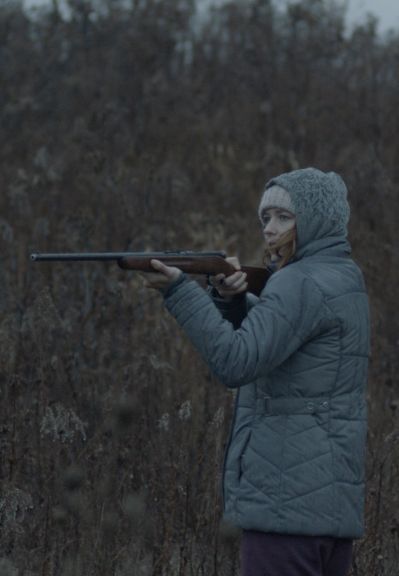 A viral plague has decimated mankind, turning its victims in mindless, flesh-craving ghouls. One of the few to have survived is Ann (Walters), who has taken up residence in the woods, where she has camped out. Ann uses the survival skills she received from her now-absent husband, Jason (West), only occasionally having to emerge and risk the threat of the infected, in order to gather supplies. Her secluded, yet relatively safe existence is disturbed, when she finds an injured man, Chris (Thompson) and his teenage daughter, Liv (Piersanti) on a road. They are supposed to be on their way north, to where the epidemic is reported to be in check. Yet Chris, in particular, seems curiously unwilling to be on his way.
A viral plague has decimated mankind, turning its victims in mindless, flesh-craving ghouls. One of the few to have survived is Ann (Walters), who has taken up residence in the woods, where she has camped out. Ann uses the survival skills she received from her now-absent husband, Jason (West), only occasionally having to emerge and risk the threat of the infected, in order to gather supplies. Her secluded, yet relatively safe existence is disturbed, when she finds an injured man, Chris (Thompson) and his teenage daughter, Liv (Piersanti) on a road. They are supposed to be on their way north, to where the epidemic is reported to be in check. Yet Chris, in particular, seems curiously unwilling to be on his way.
If there’s nothing particularly new or inventive about this version of the zombie apocalypse, it’s not without its small-scale merits. Ann is far from some kind of survivalist Mary Sue: she’s barely getting by, perhaps having paid less attention to her wilderness lessons than she should have. Probably wisely, for a small budget film, the infected – the term “zombies” is never used – are kept largely out of sight, heard more than they are seen. While their shrieks are unnerving enough, the tension comes more from internal forces: the opaque nature of Chris’s motives, for example, or Ann’s dwindling supply of bullets. The former are particularly troubling: the dynamic between Chris and Liv just seems “off” in a variety of ways, and I was not surprised when this played a part in the film’s climax. However, things do not unfold in the way I expected, so credit for that.
The film does cheat a bit with regard to previous events. At the beginning of the film, Ann is already alone, and information about what happened to Jason and their child, is only doled out in teaspoon-sized flashbacks over the course of subsequent events. It matters, because these flashbacks reveal quite a lot about her character, and the way she interacts with other people: information we otherwise don’t have. By not getting it until later, we end up retro-fitting it into what we’ve already seen, and I’m not certain the additional complexity of structure imposed, serves any real purpose.
In the earlier stages, it reminded me of The Wall, with its tale of a woman thrown back entirely onto her own resources. While that solo adventure would have been difficult to sustain, it is the most interesting and original part of proceedings. I was rather disappointed when Chris + Liv showed up, because the entire dynamic changes at that point, and the film becomes something with which I’m somewhat too familiar. While there are twists down the stretch, this rejects the chance to truly separate itself from the large pack of zombie apocalypse movies in terms of plot. Fortunately, a solid performance from Walters helps the film sustain viewer interest through the weaker second half.
Dir: Rod Blackhurst
Star: Lucy Walters, Adam David Thompson, Gina Piersanti, Shane West





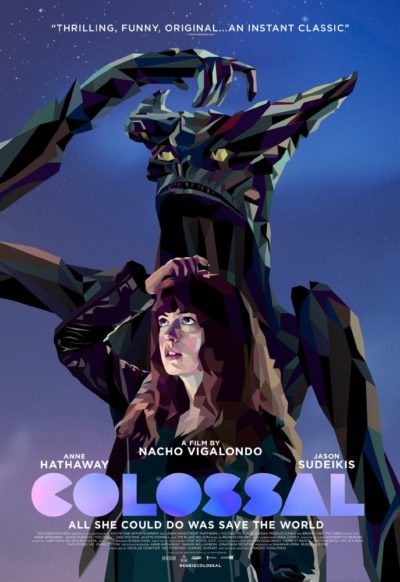 After breaking up with her boyfriend, Gloria (Hathaway) holes up in her middle-American hometown. She gets a job in a bar, run by her childhood pal, Oscar (Sudeikis) – not that this employment does much for Gloria’s burgeoning alcoholism. Meanwhile, over in Korea, the city of Seoul is being plagued by a giant monster, which will appear out of nowhere, behave oddly, and then vanish again. Gloria eventually figures out that when she goes through a particular spot – a local children’s playground – at a specific time, the creature appears in Korea, and its actions reflect hers. Turns out Oscar can do the same, manifesting in Seoul as a giant robot, and he may not be as benign with his new-found powers, as Gloria is attempting to be.
After breaking up with her boyfriend, Gloria (Hathaway) holes up in her middle-American hometown. She gets a job in a bar, run by her childhood pal, Oscar (Sudeikis) – not that this employment does much for Gloria’s burgeoning alcoholism. Meanwhile, over in Korea, the city of Seoul is being plagued by a giant monster, which will appear out of nowhere, behave oddly, and then vanish again. Gloria eventually figures out that when she goes through a particular spot – a local children’s playground – at a specific time, the creature appears in Korea, and its actions reflect hers. Turns out Oscar can do the same, manifesting in Seoul as a giant robot, and he may not be as benign with his new-found powers, as Gloria is attempting to be.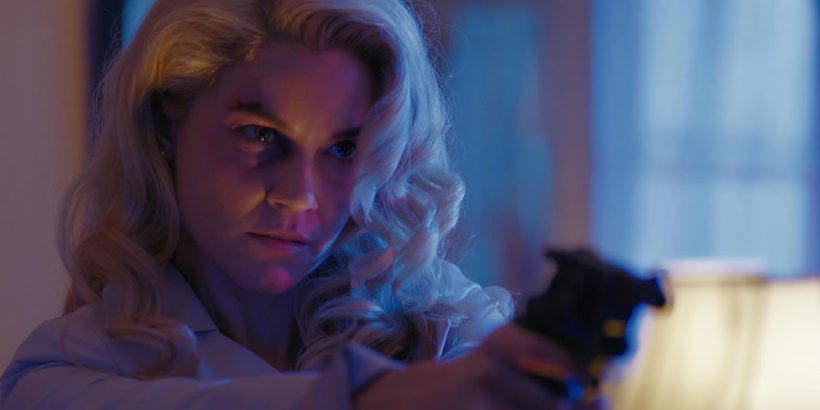 The film never tries to hide the fact that Jessica is nutty as a fruitcake. As a result, its plotting is instead very much concerned just with getting the story from Point A to B, offering few surprises. I’m not exactly convinced by the “Based on a true story” claim here. And let’s not even start with the police procedures depictede: let’s just say, Stillwater PD could use some re-training, and move on. Yet the pleasures outweighed the deficiencies; in particular, as mentioned, watching the mousy Faith and psychotic glam-girl Jessica face off. The latter gets most of the cinematic highlights, vamping it up to great effect. Witness, for example, her hyper-ventilating in order to place a convincingly panicked phone call to her lover. Guess all Jessica’s acting classes finally paid off!
The film never tries to hide the fact that Jessica is nutty as a fruitcake. As a result, its plotting is instead very much concerned just with getting the story from Point A to B, offering few surprises. I’m not exactly convinced by the “Based on a true story” claim here. And let’s not even start with the police procedures depictede: let’s just say, Stillwater PD could use some re-training, and move on. Yet the pleasures outweighed the deficiencies; in particular, as mentioned, watching the mousy Faith and psychotic glam-girl Jessica face off. The latter gets most of the cinematic highlights, vamping it up to great effect. Witness, for example, her hyper-ventilating in order to place a convincingly panicked phone call to her lover. Guess all Jessica’s acting classes finally paid off!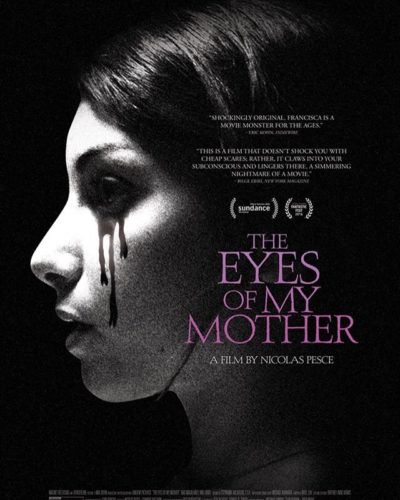 “Post-horror” is now, apparently, A Thing. It refers to horror films that subvert the traditional tropes and style of the genre in some way. Though based on the so-tagged example of it I’ve seen, the main subversion appears to be “not being frightening.” I think there’s a spot of pretension mixed in as well, since horror is generally regarded as marginally above pornography in terms of critical appreciation. By calling it something else, this gives those who turn their nose up at “horror” a chance to appreciate it. But it’s a bit of a double-edged sword for marketing, because you’re as likely to lose fans of “true” horror, who have been burned badly by films riding on the genre’s coat-tails.
“Post-horror” is now, apparently, A Thing. It refers to horror films that subvert the traditional tropes and style of the genre in some way. Though based on the so-tagged example of it I’ve seen, the main subversion appears to be “not being frightening.” I think there’s a spot of pretension mixed in as well, since horror is generally regarded as marginally above pornography in terms of critical appreciation. By calling it something else, this gives those who turn their nose up at “horror” a chance to appreciate it. But it’s a bit of a double-edged sword for marketing, because you’re as likely to lose fans of “true” horror, who have been burned badly by films riding on the genre’s coat-tails.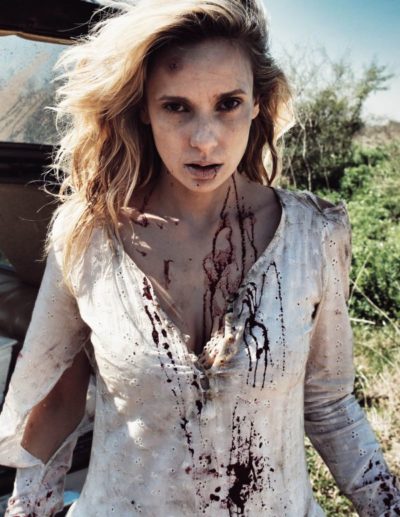 This crisp little Argentinian film clocks in at 70 minutes – not even enough to be considered a feature by the Screen Actors Guild. You’ll understand, therefore, there isn’t much fat on its bones. Virginia (Cardinali) has left her husband, taking daughter, Rebecca (Duranda), with her. But a moment’s inattention at a gas-station proves fatal, as Rebecca is abducted, and Virginia’s car driven off the road during the subsequent pursuit. Brought back (from the dead?) by a mysterious stranger (Ferro), she is told Rebecca has been chosen by a religious cult as a sacrifice. It’s up to Virginia to stop them, and she can let no-one get in her way. Which becomes an issue, for we quickly find out, she is not the only mother looking to recover a child from the cult – and, it appears, only one can succeed.
This crisp little Argentinian film clocks in at 70 minutes – not even enough to be considered a feature by the Screen Actors Guild. You’ll understand, therefore, there isn’t much fat on its bones. Virginia (Cardinali) has left her husband, taking daughter, Rebecca (Duranda), with her. But a moment’s inattention at a gas-station proves fatal, as Rebecca is abducted, and Virginia’s car driven off the road during the subsequent pursuit. Brought back (from the dead?) by a mysterious stranger (Ferro), she is told Rebecca has been chosen by a religious cult as a sacrifice. It’s up to Virginia to stop them, and she can let no-one get in her way. Which becomes an issue, for we quickly find out, she is not the only mother looking to recover a child from the cult – and, it appears, only one can succeed.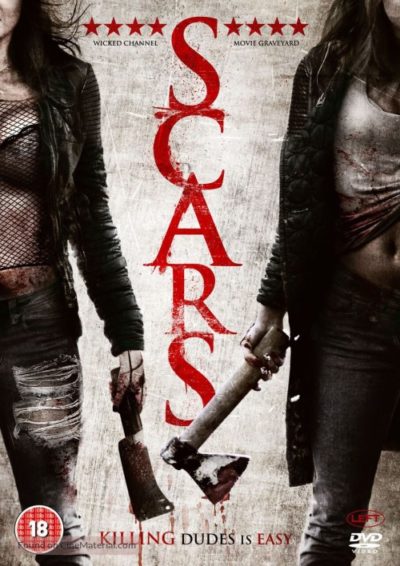 Scar (Cole) has anger issues, which we see in the opening scene, where she stabs her boyfriend to death. Scarlett (Kimmel) makes her living by having affairs with married men, then blackmailing them. The two women team up after Scar rescues Scarlett, when one of her extortion targets is beating her up in an alley. The pair subsequently begin an odd relationship, peppered with bursts of brutal violence against men. The police investigation, led by Detective Mike (Wells) passes over them, but Mike begins a relationship with Scarlett, until he begins to suspect that her friend is involved in the string of killings.
Scar (Cole) has anger issues, which we see in the opening scene, where she stabs her boyfriend to death. Scarlett (Kimmel) makes her living by having affairs with married men, then blackmailing them. The two women team up after Scar rescues Scarlett, when one of her extortion targets is beating her up in an alley. The pair subsequently begin an odd relationship, peppered with bursts of brutal violence against men. The police investigation, led by Detective Mike (Wells) passes over them, but Mike begins a relationship with Scarlett, until he begins to suspect that her friend is involved in the string of killings. Disease has wiped out most of civilization, and left those who have survived, scrambling to cope. Better equipped than most are sisters Jenny (Rothe), Sarah (Winters) and silent little Danika (Jones). For their father was a doomsday prepper, who created a “bug out” cabin in the desert, stocked with all the necessities to survive. However, neither he nor their mother are around any longer: the former died during the crisis, and the latter went out to seek help and never returned. So it’s all down to the sisters, who have been reminded about the golden rule, time and again, by their Dad: do not let anyone in, under any circumstances.
Disease has wiped out most of civilization, and left those who have survived, scrambling to cope. Better equipped than most are sisters Jenny (Rothe), Sarah (Winters) and silent little Danika (Jones). For their father was a doomsday prepper, who created a “bug out” cabin in the desert, stocked with all the necessities to survive. However, neither he nor their mother are around any longer: the former died during the crisis, and the latter went out to seek help and never returned. So it’s all down to the sisters, who have been reminded about the golden rule, time and again, by their Dad: do not let anyone in, under any circumstances.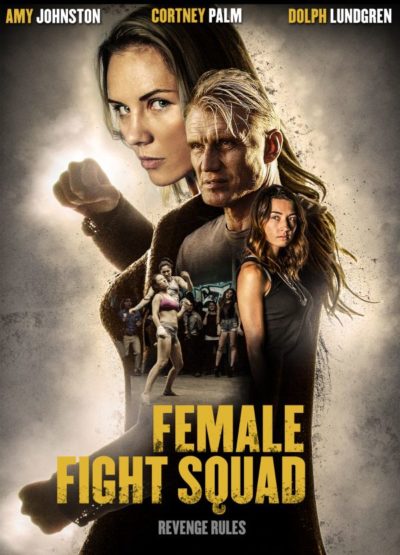 This was originally known as Female Fight Club. I presume the title was changed after a strongly-worded letter from David Fincher’s lawyers, perhaps to evoke thoughts of its star’s stunt work on Suicide Squad. It’s interesting, because Amy Johnston’s previous feature,
This was originally known as Female Fight Club. I presume the title was changed after a strongly-worded letter from David Fincher’s lawyers, perhaps to evoke thoughts of its star’s stunt work on Suicide Squad. It’s interesting, because Amy Johnston’s previous feature, 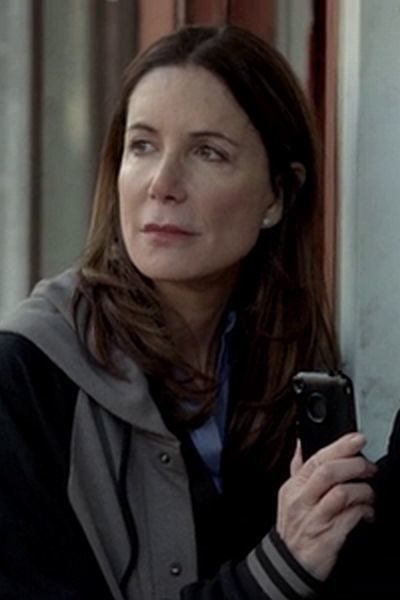 Ann Willis (Robbins) is a single mother, working as a waitress and trying to keep family together after the death of her husband from lung cancer. To help out, son David (Abrahamson) abandons his plans to attend college and gets a job in a local factory. But he falls in with some questionable company there and, lured by the prospect of easy money, starts dealing drugs for the local mobsters, run by Canarsie. Things go from bad to worse after his supposed “friend” Mike (Falahee) frames him for the disappearance of some product, and things end with David’s dead body floating in the river, having been beaten to death by his associates. The cops, and in particular, Detective Frank Hogan (Baldwin), investigate – but to be honest, aren’t particularly interested in one drug-dealer being killed.
Ann Willis (Robbins) is a single mother, working as a waitress and trying to keep family together after the death of her husband from lung cancer. To help out, son David (Abrahamson) abandons his plans to attend college and gets a job in a local factory. But he falls in with some questionable company there and, lured by the prospect of easy money, starts dealing drugs for the local mobsters, run by Canarsie. Things go from bad to worse after his supposed “friend” Mike (Falahee) frames him for the disappearance of some product, and things end with David’s dead body floating in the river, having been beaten to death by his associates. The cops, and in particular, Detective Frank Hogan (Baldwin), investigate – but to be honest, aren’t particularly interested in one drug-dealer being killed.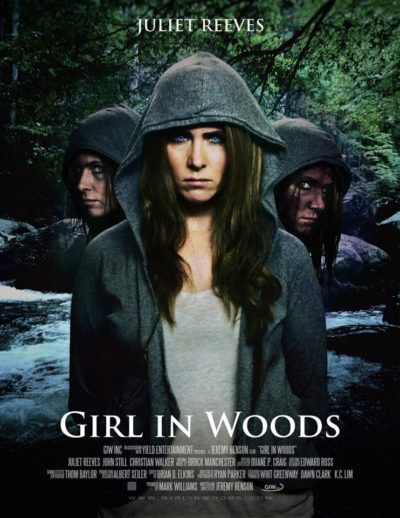 It’s always interesting when reviews of a film are deeply polarized, and that’s the case here. The first page of Google results run the gamut from “I simply despised the film as a whole” to “The images are frightening within, and the only thing better than the scares are the performances.” While I lean toward the latter, I can see how this could have failed to make a connection with some viewers, and if that happens, then there isn’t much else to prevent the former opinion. It’s the kind of film where there isn’t likey to be a middle ground in reactions.
It’s always interesting when reviews of a film are deeply polarized, and that’s the case here. The first page of Google results run the gamut from “I simply despised the film as a whole” to “The images are frightening within, and the only thing better than the scares are the performances.” While I lean toward the latter, I can see how this could have failed to make a connection with some viewers, and if that happens, then there isn’t much else to prevent the former opinion. It’s the kind of film where there isn’t likey to be a middle ground in reactions.